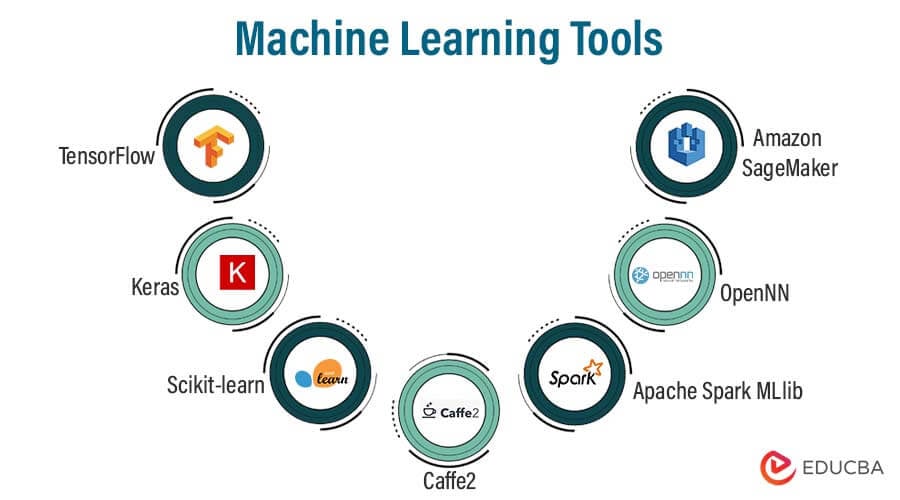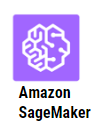Updated March 18, 2023

Introduction to Machine Learning Tools
Machine learning tools (Caffee 2, Scikit-learn, Keras, Tensorflow, etc.) are defined as the artificial intelligence algorithmic applications that give the system the ability to understand and improve without being explicitly programmed as these tools are capable of performing complex processing tasks such as the awareness of images, speech-to-text, generating natural languages, etc. These tools are used for applications in which training wheels (where the individual schedules input and the desired output) are used the termed as supervised algorithm while the tools without training wheels are unsupervised algorithms and the selection of these machine learning tools entirely depends upon the type of algorithm that needs to be used for the application.
What is Machine Learning Tool?
Machine learning tools are artificial intelligence-algorithmic applications that provide systems with the ability to understand and improve without considerable human input. It enables software, without being explicitly programmed, to predict results more accurately.
It with training wheels are supervised algorithms. They require an individual to schedule both the input and the desired output and provide feedback on the accuracy of the end results. Unsupervised algorithms demand very little human intervention by employing a “deep learning” approach in order to check massive databases and arrive at conclusions from previous example-based data of training; they are thus generally used for more complex processing tasks, such as the awareness of images, speech-to-text and generating natural languages.
Machine Learning Tools consists of:
- Preparation and data collection
- Building models
- Application deployment and training
Local Tools for Telecommunication and Remote Learning
We can compare machine learning tools with local and remote. You can download and install a local tool and use it locally, but a remote tool runs on an external server.
1. Local Tools
You can download, install and run a local tool in your local environment.
Characteristics of Local Tools are as follows:
- Adapted for data and algorithms in memory.
- Configuration and parameterisation execution control.
- Integrate your systems to satisfy your requirements.
Examples of Local Tools are Shogun, Golearn for Go, etc.
2. Remote Tools
This tool is hosted from the server and called to your local environment. These instruments are often called Machine Learning as a Service (MLaaS).
- Customized for larger datasets to run on a scale.
- Execute multiple devices, multiple nuclei, and shared storage.
- Simpler interfaces provide less configuration control and parameterizing of the algorithm.
Examples of these Tools are Machine Learning in AWS, Prediction in Google, Apache Mahout, etc.
Tools for Machine Learning
Given below are the different tools for machine learning:
1. TensorFlow
This is a machine learning library from Google Brain of Google’s AI organization released in 2015. Tensor Flow allows you to create your own libraries. We can also use C++ and python language because of flexibility. An important characteristic of this library is that data flow diagrams are used to represent numerical computations with the help of nodes and edges. Mathematical operations are represented by nodes, whereas edges denote multidimensional data arrays on which operations are performed. TensorFlow is used by many famous companies like eBay, Twitter, Dropbox, etc. It also provides great development tools, especially in Android.
2. Keras
Keras is a deep-learning Python library that can run on top of Theano, TensorFlow. Francois Chollet, a member of the Google Brain team, developed it to give data scientists the ability to run machine learning programs fast. Because of using the high-level, understandable interface of the library and dividing networks into sequences of separate modules, rapid prototyping is possible. It is more popular because of the user interface, ease of extensibility, and modularity. It runs on CPU as well as GPU.
3. Scikit-learn
Scikit-learn, which was first released in 2007, is an open-source library for machine learning. Python is a scripting language of this framework and includes several models of machine learning such as classification, regression, clustering, and reduction of dimensionality. Scikit-learn is designed on three open-source projects — Matplotlib, NumPy, and SciPy. Scikit-learn provides users with n number of machine learning algorithms. The framework library focuses on data modeling but not on loading, summarizing, manipulating data.
4. Caffe2
Caffe2 is an updated version of Caffe. It is a lightweight, open-source machine learning tool developed by Facebook. It has an extensive machine learning library to run complex models. Also, it supports mobile deployment. This library has C++ and Python API, which allows developers to prototype first, and optimization can be done later.
5. Apache Spark MLlib
Apache Spark MLlib is a distributed framework for machine learning. The Spark core is developed at the top. Apache sparks MLlib is nine-time faster than disk-based implementation. It is used widely as an open-source project which makes focuses on machine learning to make it easy. Apache Spark MLlib has a library for scalable vocational training. MLlib includes algorithms for regression, collaborative filters, clustering, decisions trees, pipeline APIs of higher levels.
6. OpenNN
OpenNN is developed by the artificial intelligence company Artelnics. OpenNN is an advanced analytics firmware library written in C++. The most successful method of machine learning is the implementation of neural networks. It is high in performance. The execution speed and memory allocation of this library stand out.
7. Amazon SageMaker
Amazon SageMaker is a fully managed service that allows data researchers and developers to build, train and implement machine learning models on any scale quickly and easily. Amazon SageMaker supports open-source web application Jupyter notebooks that help developers share live code. These notebooks include drivers, packages, and libraries for common deep learning platforms and frameworks for SageMaker users. Amazon SageMaker optionally encrypts models both during and during transit through AWS Key Management Service, and API requests are performed over a secure connection to the socket layer. SageMaker also stores code in volumes that are protected and encrypted by security groups.
Conclusion
Before developing machine learning applications, it is very important to select a machine learning tool that has extensive libraries, a great user interface, and support for common programming languages. So this has been a guide to Machine learning tools that will help in selecting the required technology.
Recommended Articles
This has been a guide to Machine Learning Tools. Here we have discussed the tools for machine learning and the local tools for telecommunication and remote learning. You can also go through our other suggested articles to learn more-







